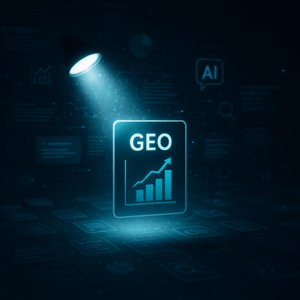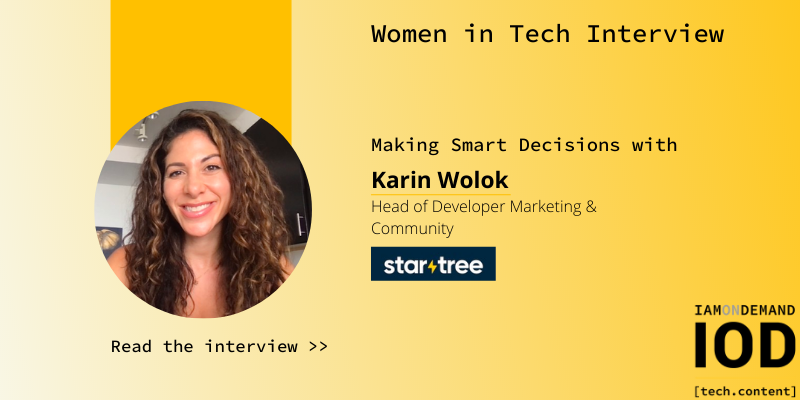Who makes the decisions in your company? In honor of International Women’s Day on March 8th, we’re taking the entire month of March to celebrate female leaders in technology. Why a whole month? Because there are just too many women out there doing great things to profile only one.
In our last post, we met Michal Wosk, Marketing VP at Treeverse, who is hard at work carving out space for women to be coders, executives, and moms —following their dreams while enriching the tech space.
Today, we’re looking at making decisions, from big decisions in the C-suite to the millions of little choices we—and our apps—make every single day. That’s what StarTree is doing: creating an open-source platform to help make data-based, user-facing analytics part of every modern app.
Data-based decision making also sums up what Karin Wolok, StarTree’s Head of Developer Marketing and Community, has done in her own career. From a B.A. in broadcasting and a background in major entertainment and event production companies, she started exploring tech fields and discovered her love for application development and data science. In other words, Karin analyzed the data—all the directions her career could have gone—then took a leap of faith, entering a field where today she’s gratified to discover all the ways she can make a difference.
STARTREE QUICK STATS
Founded: 2019
HQ: Mountain View, CA
Site: https://startree.ai
Are there any unknown facts about your backstory and career path? How did you get into tech?
My career didn’t actually start in technology; it began in entertainment. Going into tech was somewhat of an accident…it was just where the lack of direction in my early career path led me. I had taken a pretty entry-level position working for a boutique marketing company under Shady Records, Eminem’s record label (thanks to Alvon Miller, National Director of Marketing at Shady, for giving me the opportunity!). While I was there, I worked on all kinds of new releases—generating buzz and creating guerrilla marketing campaigns and sponsorship opportunities for consumer brands. That role was so much fun and taught me a lot of the foundations I built my career on: building on consumer energy and enthusiasm, building brand loyalty through association piggy-backing, and creating virality.
After a few years working for some of the largest entertainers in the world, I went on to take a position with Live Nation (thanks to Michael Grozier, EVP at Live Nation), the largest live events company in the world. There, I focused on building VIP guest experiences. I learned about how to build value on an experience and a feeling. While the role was fun and exciting, it wasn’t for me. I felt like I had all these ideas that I couldn’t take initiative on because the company was so large and had so many strictly enforced policies. I felt like only a portion of my ability was being utilized.
Because I felt underutilized, I frequently engaged in side projects. I started a women’s networking group, hosting regularly scheduled events in both NYC and Philadelphia, and frequently picked up contracting projects to push PR strategies or build some kind of marketing campaign from scratch. I won’t go into detail, I almost lost my job on multiple occasions because of the side projects I worked on.
While at Live Nation, I hired some “VIP guest services” people (aka, my friends) to help me work a show. Eventually, one of those women started a company, took a small investment, and hired me as her first hire. This was my break into tech. We helped people who work in tech find a job or… love. (I know, crazy! haha). With this company, I had the ability to speak to a lot of software developers and listen to presentations about application development and data science, and I got involved with my local data-science community. It was almost like a mini university.
With that experience, I felt confident to look into roles managing developer communities. My former boss, Ryan Boyd (Head of DevRel at Neo4j) took a leap of faith and gave me the first opportunity in my new career path. This is where I started building my path in tech. Three and a half years later, a fellow tech community friend and confidant, Kenny Bastani, came to me with the opportunity to lead the developer community at StarTree, a promising startup company which was in stealth when I initially engaged with them.
What’s interesting about entertainment versus tech is that in tech, there is a lot of effort and support to help women succeed in their career paths. It broke down a lot of barriers and imposter syndrome, giving me a lot of direction, understanding, and confidence to move up in my career.
When I look back, every step in my career path was assisted by someone who believed in me. They took the chance, and I just did my best.
Our Latest Posts

The Tech Marketer’s Guide to Generative Engine Optimization (GEO)
Key Insights GEO and AEO are essential for AI-era discoverability. Generative engine optimization (GEO) and answer engine optimization (AEO) are now critical for getting your

How to Master Prompt Design for Tech Marketers
Do you remember your first ChatGPT question? Mine was: “Write a marketing email for our product launch.” But the result was pure corporate boilerplate, generic

AWS Prompt Engineering 101: A Beginner’s Guide
Let’s be honest: AI implementations often struggle not because of the technology itself, but because of how we communicate with it. And in AI, by
Which aspects of your job do you like most?
The flexibility to be creative and manage my own schedule. I also feel a lot of ownership with what I do. I can see and feel the impacts I make as things progress. It’s so fun to be able to see the output of your efforts and that it’s working!
What skills do you think are most important for a developer marketing professional?
Empathy and open-mindedness. I drive everything I do around empathy. How would I feel? How would I want to be approached? Etc. Also, understanding the importance of giving and providing value to your audience.
What challenges do you think women in tech are facing today? Have you experienced any challenges yourself?
I think a lot of it is from internal battles. We need to believe in ourselves and be okay with pushing back. I’ve experienced a lot of challenges, but I think if you know that you are good at what you do and you know what you’re talking about, you shouldn’t be scared to speak up, no matter what it is. Also, it’s great to have a support system around you—men and women. I have a lot of professionals I can call on when I have questions, need to bounce ideas off someone, or need help coming to a decision.
Can you share some demographics about women at StarTree? In what areas/positions would you like to see more women leaders (within the company)?
StarTree has an incredible group of women who are all rockstars in their respective fields: engineering, product, marketing, DevRel, etc. We have an internal network to make sure we connect regularly and support each other and identify opportunities to improve our diversity, equality, and inclusion. Though the number of women in the infrastructure space is growing, currently the pool of candidates isn’t very diverse. I’d love to see more women in all areas of the company, especially in engineering and at a higher leadership level.
Can you offer one tip for women aspiring to work in leadership positions?
I have two: Believe in yourself and don’t be afraid to ask for what you want… and ask for MORE than what you want.
Summary
Karin mentions imposter syndrome, and she’s probably not the only woman who has felt like she didn’t have the right to claim her place in a tech company. But with the kind of support system Karin is helping to build, other women will hopefully also step up and usher in the diversity she wants to see in the very near future.
Stay tuned for our next profile, in which Sharone Revah Zitzman, Chief Manual Reader at RTFM Please, speaks about her vision of entrepreneurship beyond boundaries and building the bridges she needed to guide companies from dev to engineering, sales to marketing, and beyond.

